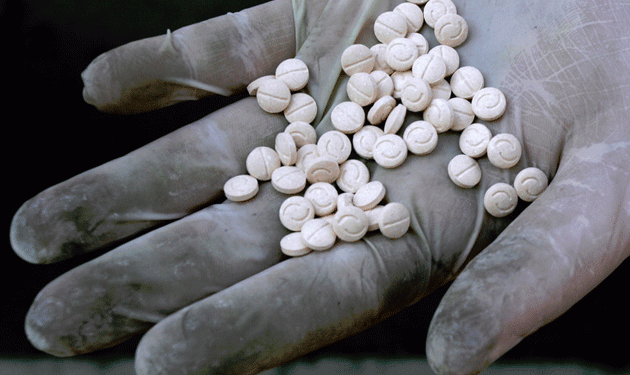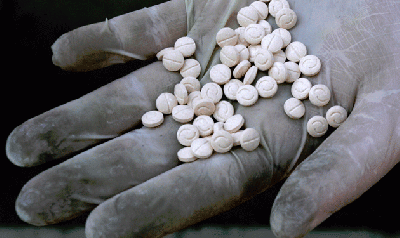The Minister of Interior in the caretaker government, Bassam Mawlawi, revealed new information regarding the smuggling of Captagon, the names of smugglers, and manufacturing locations. He stated that the sites for Captagon manufacturing and smuggling are concentrated in the eastern mountain range on the Lebanese-Syrian border. It is no secret to say that Captagon factories are located on the Syrian side near the Lebanese border, and what exists in Lebanon is also located near the eastern range, most of which are known to the Lebanese security agencies, which regularly conduct raids on them.
In the latest operation at the Port of Beirut destined for Kuwait via Sudan, investigations revealed the identities of several Syrians and Lebanese, including a Syrian named Bassam Yahya al-Zoubi and a Lebanese named Ayoub Zaiter. He indicated that the operation was tracked from the moment Captagon was prepared and packaged from a pickup truck to the container in a region near Zahle, specifically in Ferzol. Phone numbers used for communication within Lebanon regarding packaging and delivery to the port were obtained, as was the identity of the company facilitating the transport. Security agencies have some informants who assist and monitor these operations and report to the security forces.
Mawlawi added that as a result of ongoing investigations led by the judiciary, with assistance from the Information Branch and the Anti-Drug Office, he has formally requested ministries such as the Ministry of Agriculture and the Ministry of Industry to prevent the activity of any company that might be suspected of drug smuggling, stating that the issue cannot be postponed each time.
In an interview with Al-Hurra channel on the Lebanese scene program with Mona Sleiba, Mawlawi explained that the majority of Captagon factories, whether on the Syrian or Lebanese side, are located in areas that are difficult to secure. The Lebanese Army and security forces are doing what is necessary for security and conducting raids, but this entails military and security considerations.
In response to a question about whether those areas are under the influence of Hezbollah, which complicates security forces' missions, he replied that these areas are located near the Lebanese-Syrian border and are under the influence of gangs and drug traffickers, who form hotspots for crime, forgery, and corruption. He assured that security forces would not abandon these areas, regardless of who is behind them, emphasizing their commitment to transparency and to the security and interests of the Lebanese people, as well as Lebanon's relations with friendly Arab countries.
He stated, "We will not accept that Lebanon be a passage for harming any country." Regarding the disasters associated with illegal immigration, Mawlawi confirmed that military and security forces are fulfilling their duties. Recently, 24 operations aimed at smuggling migrants abroad were thwarted, all originating from northern Lebanon due to its proximity to Syrian, Turkish, Greek, and Cypriot shores. He noted that there were last week qualitative operations by the Lebanese Army and the Information Branch to arrest networks or boats prepared for smuggling Lebanese, Syrians, and Palestinians.
Mawlawi clarified that smuggling networks are composed of both Lebanese and Syrians, and they have arrested more than 200 illegal migrants recently. When asked who protects these smuggling networks, he stated that investigations have not revealed any specific groups or forces behind them. He confirmed that there is communication with neighboring countries involved in the illegal migrants' transit via the Ministry of Foreign Affairs or through the Minister of Interior, and the Lebanese state is doing all it can to combat illegal immigration.
About the role of security forces in managing confrontations between banks and depositors, he said he would not pit security forces against citizens and would not accept casualties among citizens at the hands of security forces, or vice versa. Banks, as private institutions, are responsible for ensuring the safety of their employees and customers, and security forces perform their duties to maintain public order. However, it is not the task of a security officer to stand guard at bank doors. If incidents like last week's confrontations between depositors and banks occur, he confirmed they would be addressed with the same calmness and wisdom as in previous incidents.
He answered a question about entities suspected of inciting depositors to act, saying those who urge citizens towards chaos reveal themselves, often issuing statements and threats. He did not disclose whether last week's banking events were interconnected, stating he would not divulge anything that could compromise the investigation.
Regarding the general security situation in Lebanon, Mawlawi regarded it as relatively good given the social and economic conditions. Security forces are dedicated to protecting citizens despite their own challenging circumstances. He noted that crime rates have not increased; they have remained stable, with slight variations: homicide rates increased by 10% from 2021 to 2022, thefts increased by 19%, robbery rates decreased by 11%, car thefts dropped by 15%, and ordinary thefts decreased by 8%. He emphasized that Lebanon is still at an acceptable crime rate given the poor economic situation.
Mawlawi reiterated the continuous pursuit of additional resources for security forces under the Ministry of Interior and requested necessary resources from the government or parliament through budget approvals or decrees related to food and medical supplies. While they have received ongoing food aid from abroad, he noted that no financial or cash assistance has been secured yet.
On the security challenges posed by the large presence of Syrian refugees in Lebanon, he stated that more than one-third of the population consists of non-Lebanese individuals. Some refugees are legally present, while others are not, which indeed imposes a security burden and stresses the infrastructure, as well as an over-representation of non-Lebanese individuals in prisons, which constitutes a significant strain on the Lebanese state.
About the meeting at Dar Al-Fatwa with Sunni deputies and the subsequent gathering at the Saudi ambassador's residence, Mawlawi welcomed what he described as a major national meeting at Dar Al-Fatwa and supported the statement that emerged from it, which was on a national level. He affirmed that Saudi Arabia has never abandoned Lebanon, even if it experienced some disappointment or anger during certain periods due to actions taken within Lebanon related to drug smuggling or other matters that interfere with Saudi affairs.
He stated the ongoing harm inflicted on Saudi communities stems from Lebanese events, which constitutes interference in Saudi politics—something that is not acceptable. The meetings at the ambassador’s residence and Dar Al-Fatwa reaffirmed commitment to the Taif Agreement, with Mawlawi asserting that any attempts to undermine it are tantamount to playing with Lebanon's entity and balance, which was rejected in both meetings.
Regarding the possibility of presidential vacancy and its repercussions, Mawlawi noted that the constitution refers to a vacancy in the presidency without addressing a power vacuum, meaning that the government holds the power and fills the vacancy in the absence of a presidential election. He added that a vacancy in the presidency does not affect the government's powers, existence, or result in a constitutional or governance vacuum.
He affirmed that according to the constitution, in the event of a presidential vacancy, powers are transferred to the government, which is not specified as a caretaker government, and the nature of governance cannot accommodate a vacuum, as the constitution does not allow for it.
Concerning a report from the French newspaper Le Figaro regarding potential returning Lebanese fighters from ISIS to Lebanon from Iraq, he stated they verified this matter with security agencies and military intelligence, with no clear information available on the topic. He reassured the Lebanese that there is no fear of terrorism returning to Lebanon, and they continue to closely monitor any movements in this regard.
Mawlawi once again confirmed that the fundamental issue in prisons is overcrowding, currently at 3.4% overcapacity. Additionally, 79.1% of inmates are unconvicted, and 43% of those in prisons are non-Lebanese. He stated that the prison situation represents one of the main focuses of the Ministry of Interior.
Regarding the crisis of providing food for inmates, he explained that it is being addressed through decrees to secure food and logistics contracts. Also, agreements are being pursued to ensure medical care, having reached an agreement with the International Committee of the Red Cross to receive inmates in Rafik Hariri University Hospital and cooperation with Italian international agencies for development and cooperation to provide medication for inmates, continuing to monitor this issue closely.




